HOSP8110: International Hospitality Law Comparison - Canada & India
VerifiedAdded on 2023/01/17
|6
|1442
|37
Report
AI Summary
This report offers a comprehensive comparison of hospitality law in Canada and India, analyzing key aspects such as the service and sale of alcohol, contract law, and employment laws. The report highlights the differences in alcohol licensing and online sales regulations, where Canada allows for online alcohol delivery with appropriate licenses, while India prohibits online alcohol sales. It also explores the similarities and differences in contract law, including the application of common law principles and the doctrine of exclusion clauses. Furthermore, the report examines employment laws, including working hours and employee rights, noting the differences in maximum daily working hours and the requirement for breaks. The conclusion emphasizes the importance of understanding these legal differences for hospitality companies expanding into international markets to avoid legal penalties and sustain growth. The report references relevant legal acts, studies, and regulations to support its findings.
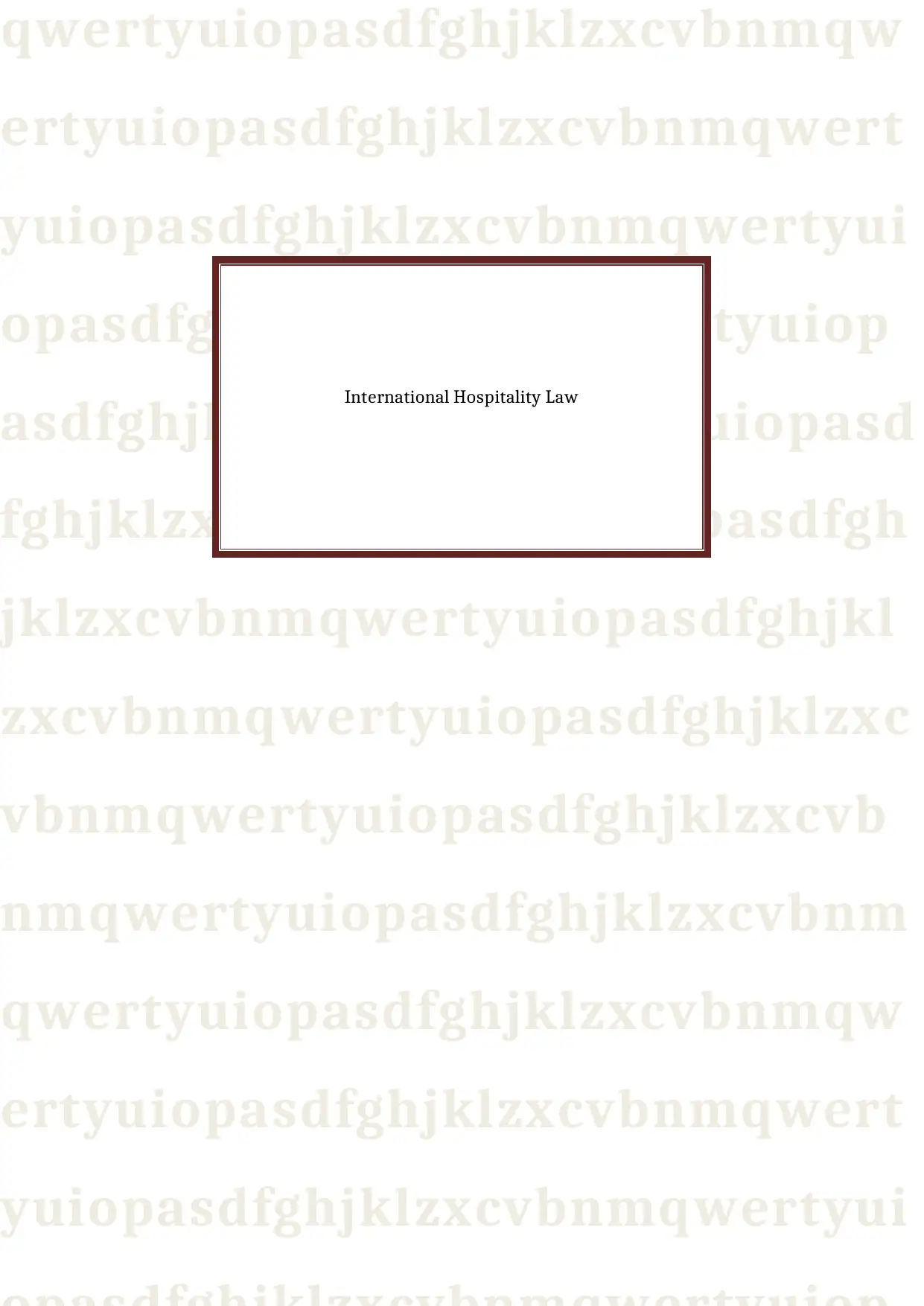
qwertyuiopasdfghjklzxcvbnmqw
ertyuiopasdfghjklzxcvbnmqwert
yuiopasdfghjklzxcvbnmqwertyui
opasdfghjklzxcvbnmqwertyuiop
asdfghjklzxcvbnmqwertyuiopasd
fghjklzxcvbnmqwertyuiopasdfgh
jklzxcvbnmqwertyuiopasdfghjkl
zxcvbnmqwertyuiopasdfghjklzxc
vbnmqwertyuiopasdfghjklzxcvb
nmqwertyuiopasdfghjklzxcvbnm
qwertyuiopasdfghjklzxcvbnmqw
ertyuiopasdfghjklzxcvbnmqwert
yuiopasdfghjklzxcvbnmqwertyui
International Hospitality Law
ertyuiopasdfghjklzxcvbnmqwert
yuiopasdfghjklzxcvbnmqwertyui
opasdfghjklzxcvbnmqwertyuiop
asdfghjklzxcvbnmqwertyuiopasd
fghjklzxcvbnmqwertyuiopasdfgh
jklzxcvbnmqwertyuiopasdfghjkl
zxcvbnmqwertyuiopasdfghjklzxc
vbnmqwertyuiopasdfghjklzxcvb
nmqwertyuiopasdfghjklzxcvbnm
qwertyuiopasdfghjklzxcvbnmqw
ertyuiopasdfghjklzxcvbnmqwert
yuiopasdfghjklzxcvbnmqwertyui
International Hospitality Law
Paraphrase This Document
Need a fresh take? Get an instant paraphrase of this document with our AI Paraphraser
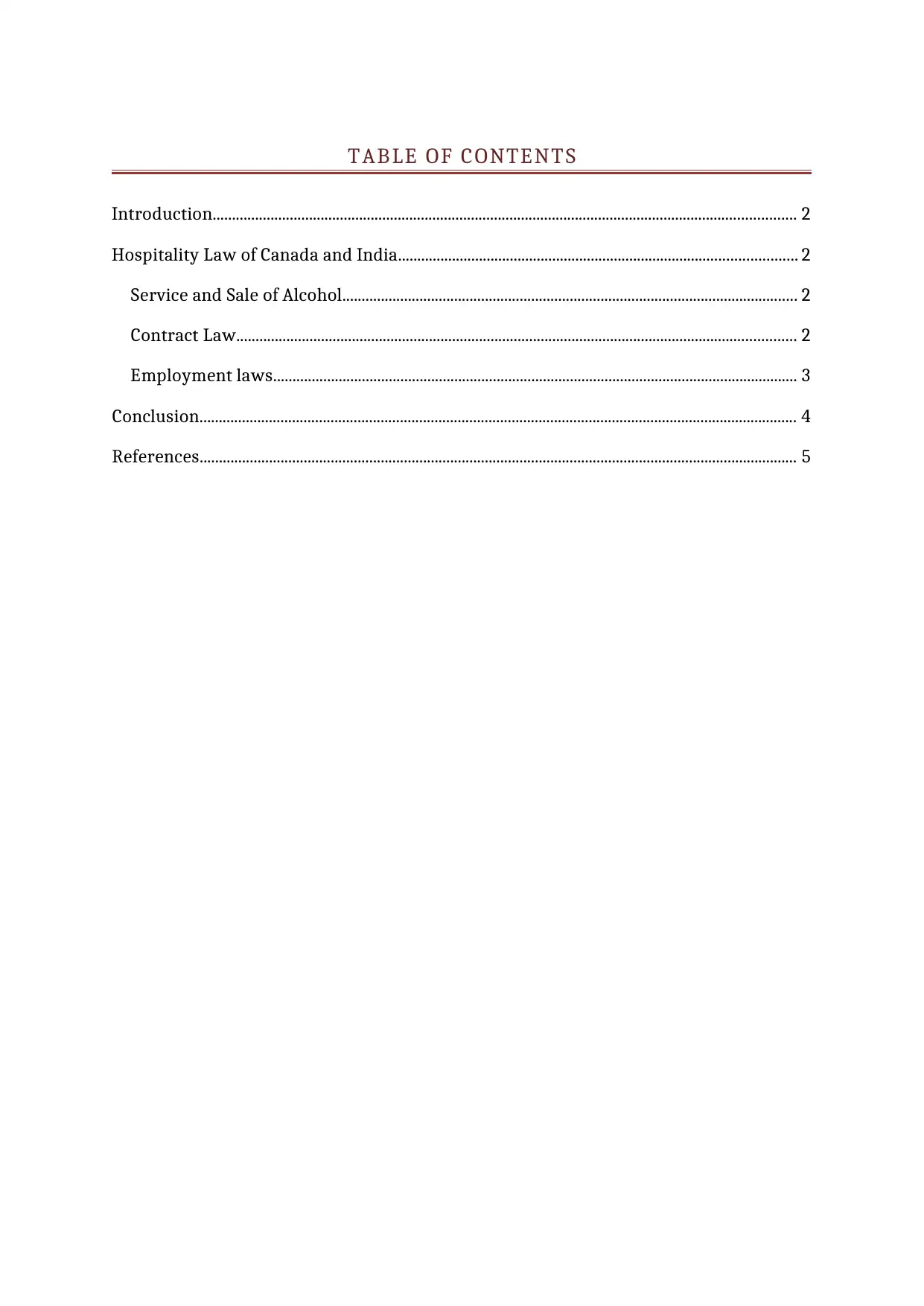
TABLE OF CONTENTS
Introduction....................................................................................................................................................... 2
Hospitality Law of Canada and India....................................................................................................... 2
Service and Sale of Alcohol...................................................................................................................... 2
Contract Law................................................................................................................................................. 2
Employment laws........................................................................................................................................ 3
Conclusion........................................................................................................................................................... 4
References........................................................................................................................................................... 5
Introduction....................................................................................................................................................... 2
Hospitality Law of Canada and India....................................................................................................... 2
Service and Sale of Alcohol...................................................................................................................... 2
Contract Law................................................................................................................................................. 2
Employment laws........................................................................................................................................ 3
Conclusion........................................................................................................................................................... 4
References........................................................................................................................................................... 5
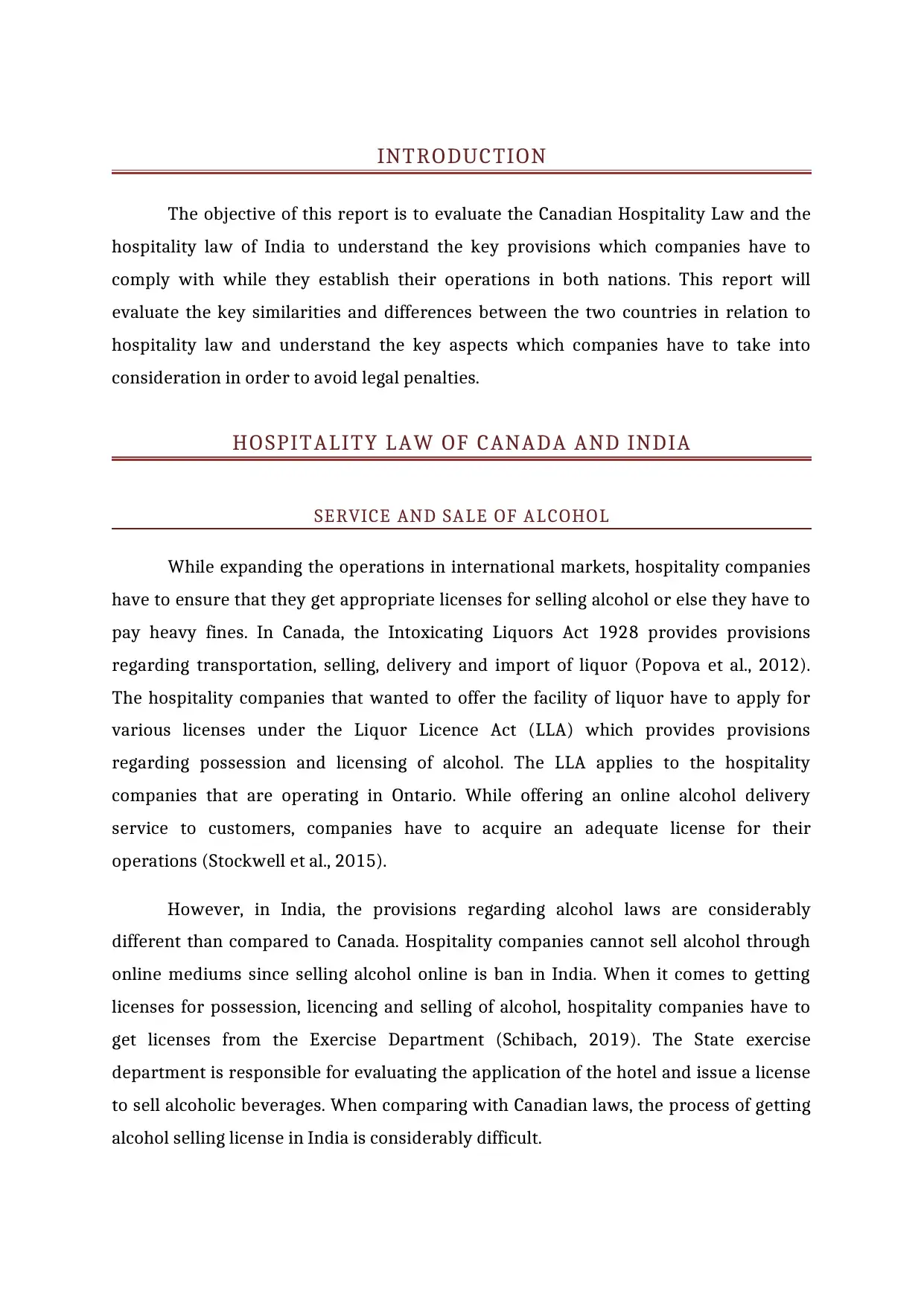
INTRODUCTION
The objective of this report is to evaluate the Canadian Hospitality Law and the
hospitality law of India to understand the key provisions which companies have to
comply with while they establish their operations in both nations. This report will
evaluate the key similarities and differences between the two countries in relation to
hospitality law and understand the key aspects which companies have to take into
consideration in order to avoid legal penalties.
HOSPITALITY LAW OF CANADA AND INDIA
SERVICE AND SALE OF ALCOHOL
While expanding the operations in international markets, hospitality companies
have to ensure that they get appropriate licenses for selling alcohol or else they have to
pay heavy fines. In Canada, the Intoxicating Liquors Act 1928 provides provisions
regarding transportation, selling, delivery and import of liquor (Popova et al., 2012).
The hospitality companies that wanted to offer the facility of liquor have to apply for
various licenses under the Liquor Licence Act (LLA) which provides provisions
regarding possession and licensing of alcohol. The LLA applies to the hospitality
companies that are operating in Ontario. While offering an online alcohol delivery
service to customers, companies have to acquire an adequate license for their
operations (Stockwell et al., 2015).
However, in India, the provisions regarding alcohol laws are considerably
different than compared to Canada. Hospitality companies cannot sell alcohol through
online mediums since selling alcohol online is ban in India. When it comes to getting
licenses for possession, licencing and selling of alcohol, hospitality companies have to
get licenses from the Exercise Department (Schibach, 2019). The State exercise
department is responsible for evaluating the application of the hotel and issue a license
to sell alcoholic beverages. When comparing with Canadian laws, the process of getting
alcohol selling license in India is considerably difficult.
The objective of this report is to evaluate the Canadian Hospitality Law and the
hospitality law of India to understand the key provisions which companies have to
comply with while they establish their operations in both nations. This report will
evaluate the key similarities and differences between the two countries in relation to
hospitality law and understand the key aspects which companies have to take into
consideration in order to avoid legal penalties.
HOSPITALITY LAW OF CANADA AND INDIA
SERVICE AND SALE OF ALCOHOL
While expanding the operations in international markets, hospitality companies
have to ensure that they get appropriate licenses for selling alcohol or else they have to
pay heavy fines. In Canada, the Intoxicating Liquors Act 1928 provides provisions
regarding transportation, selling, delivery and import of liquor (Popova et al., 2012).
The hospitality companies that wanted to offer the facility of liquor have to apply for
various licenses under the Liquor Licence Act (LLA) which provides provisions
regarding possession and licensing of alcohol. The LLA applies to the hospitality
companies that are operating in Ontario. While offering an online alcohol delivery
service to customers, companies have to acquire an adequate license for their
operations (Stockwell et al., 2015).
However, in India, the provisions regarding alcohol laws are considerably
different than compared to Canada. Hospitality companies cannot sell alcohol through
online mediums since selling alcohol online is ban in India. When it comes to getting
licenses for possession, licencing and selling of alcohol, hospitality companies have to
get licenses from the Exercise Department (Schibach, 2019). The State exercise
department is responsible for evaluating the application of the hotel and issue a license
to sell alcoholic beverages. When comparing with Canadian laws, the process of getting
alcohol selling license in India is considerably difficult.
⊘ This is a preview!⊘
Do you want full access?
Subscribe today to unlock all pages.

Trusted by 1+ million students worldwide
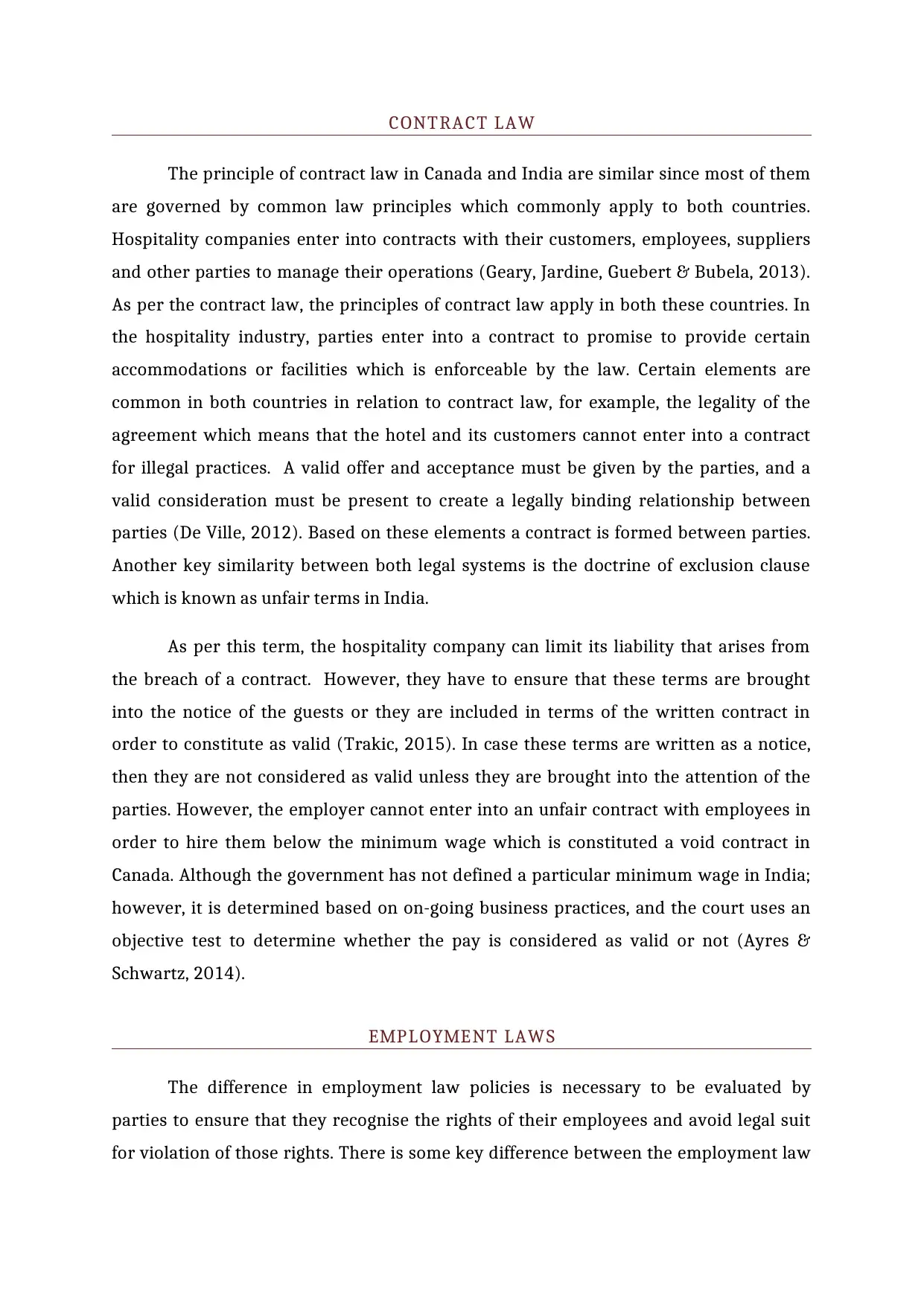
CONTRACT LAW
The principle of contract law in Canada and India are similar since most of them
are governed by common law principles which commonly apply to both countries.
Hospitality companies enter into contracts with their customers, employees, suppliers
and other parties to manage their operations (Geary, Jardine, Guebert & Bubela, 2013).
As per the contract law, the principles of contract law apply in both these countries. In
the hospitality industry, parties enter into a contract to promise to provide certain
accommodations or facilities which is enforceable by the law. Certain elements are
common in both countries in relation to contract law, for example, the legality of the
agreement which means that the hotel and its customers cannot enter into a contract
for illegal practices. A valid offer and acceptance must be given by the parties, and a
valid consideration must be present to create a legally binding relationship between
parties (De Ville, 2012). Based on these elements a contract is formed between parties.
Another key similarity between both legal systems is the doctrine of exclusion clause
which is known as unfair terms in India.
As per this term, the hospitality company can limit its liability that arises from
the breach of a contract. However, they have to ensure that these terms are brought
into the notice of the guests or they are included in terms of the written contract in
order to constitute as valid (Trakic, 2015). In case these terms are written as a notice,
then they are not considered as valid unless they are brought into the attention of the
parties. However, the employer cannot enter into an unfair contract with employees in
order to hire them below the minimum wage which is constituted a void contract in
Canada. Although the government has not defined a particular minimum wage in India;
however, it is determined based on on-going business practices, and the court uses an
objective test to determine whether the pay is considered as valid or not (Ayres &
Schwartz, 2014).
EMPLOYMENT LAWS
The difference in employment law policies is necessary to be evaluated by
parties to ensure that they recognise the rights of their employees and avoid legal suit
for violation of those rights. There is some key difference between the employment law
The principle of contract law in Canada and India are similar since most of them
are governed by common law principles which commonly apply to both countries.
Hospitality companies enter into contracts with their customers, employees, suppliers
and other parties to manage their operations (Geary, Jardine, Guebert & Bubela, 2013).
As per the contract law, the principles of contract law apply in both these countries. In
the hospitality industry, parties enter into a contract to promise to provide certain
accommodations or facilities which is enforceable by the law. Certain elements are
common in both countries in relation to contract law, for example, the legality of the
agreement which means that the hotel and its customers cannot enter into a contract
for illegal practices. A valid offer and acceptance must be given by the parties, and a
valid consideration must be present to create a legally binding relationship between
parties (De Ville, 2012). Based on these elements a contract is formed between parties.
Another key similarity between both legal systems is the doctrine of exclusion clause
which is known as unfair terms in India.
As per this term, the hospitality company can limit its liability that arises from
the breach of a contract. However, they have to ensure that these terms are brought
into the notice of the guests or they are included in terms of the written contract in
order to constitute as valid (Trakic, 2015). In case these terms are written as a notice,
then they are not considered as valid unless they are brought into the attention of the
parties. However, the employer cannot enter into an unfair contract with employees in
order to hire them below the minimum wage which is constituted a void contract in
Canada. Although the government has not defined a particular minimum wage in India;
however, it is determined based on on-going business practices, and the court uses an
objective test to determine whether the pay is considered as valid or not (Ayres &
Schwartz, 2014).
EMPLOYMENT LAWS
The difference in employment law policies is necessary to be evaluated by
parties to ensure that they recognise the rights of their employees and avoid legal suit
for violation of those rights. There is some key difference between the employment law
Paraphrase This Document
Need a fresh take? Get an instant paraphrase of this document with our AI Paraphraser
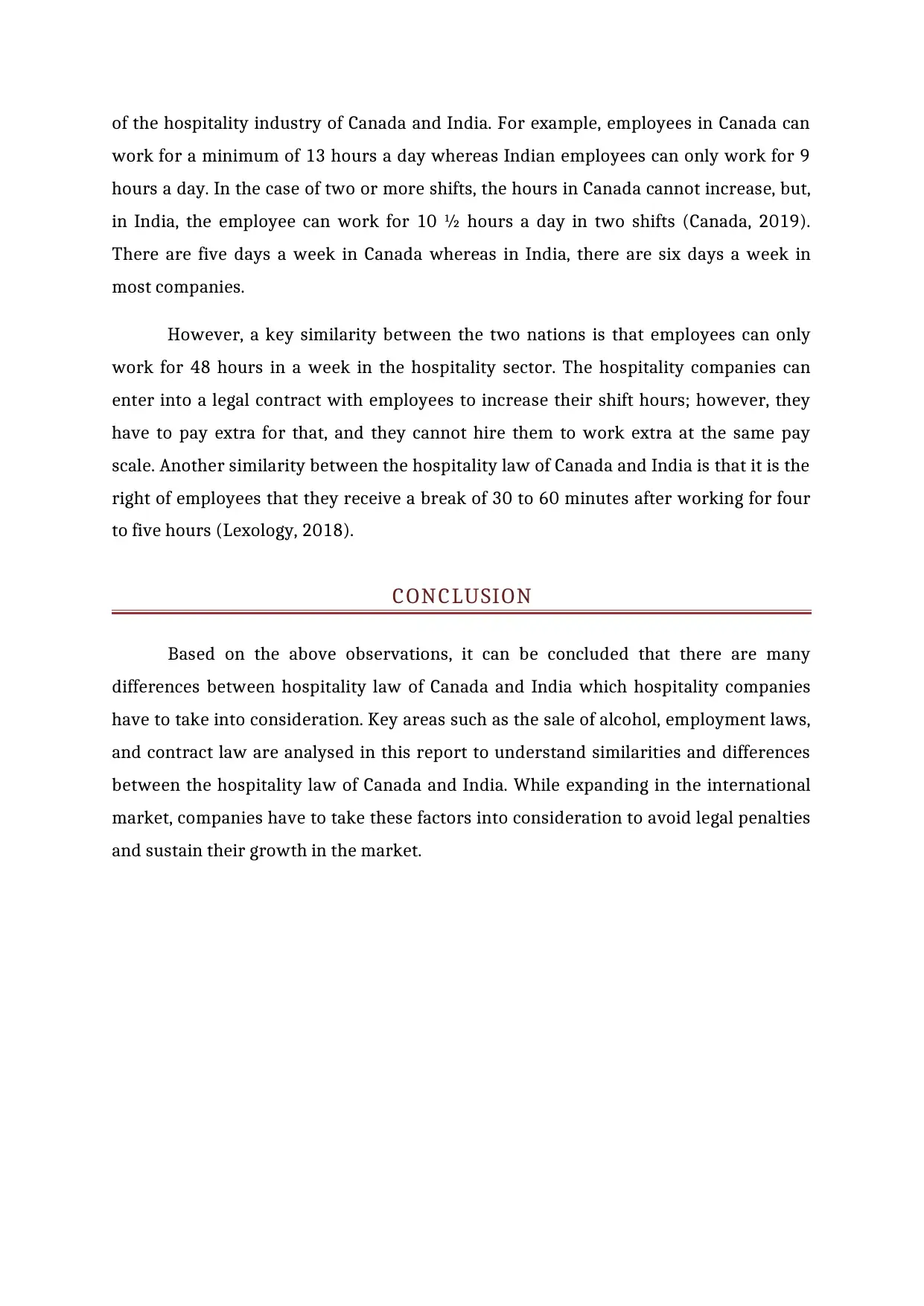
of the hospitality industry of Canada and India. For example, employees in Canada can
work for a minimum of 13 hours a day whereas Indian employees can only work for 9
hours a day. In the case of two or more shifts, the hours in Canada cannot increase, but,
in India, the employee can work for 10 ½ hours a day in two shifts (Canada, 2019).
There are five days a week in Canada whereas in India, there are six days a week in
most companies.
However, a key similarity between the two nations is that employees can only
work for 48 hours in a week in the hospitality sector. The hospitality companies can
enter into a legal contract with employees to increase their shift hours; however, they
have to pay extra for that, and they cannot hire them to work extra at the same pay
scale. Another similarity between the hospitality law of Canada and India is that it is the
right of employees that they receive a break of 30 to 60 minutes after working for four
to five hours (Lexology, 2018).
CONCLUSION
Based on the above observations, it can be concluded that there are many
differences between hospitality law of Canada and India which hospitality companies
have to take into consideration. Key areas such as the sale of alcohol, employment laws,
and contract law are analysed in this report to understand similarities and differences
between the hospitality law of Canada and India. While expanding in the international
market, companies have to take these factors into consideration to avoid legal penalties
and sustain their growth in the market.
work for a minimum of 13 hours a day whereas Indian employees can only work for 9
hours a day. In the case of two or more shifts, the hours in Canada cannot increase, but,
in India, the employee can work for 10 ½ hours a day in two shifts (Canada, 2019).
There are five days a week in Canada whereas in India, there are six days a week in
most companies.
However, a key similarity between the two nations is that employees can only
work for 48 hours in a week in the hospitality sector. The hospitality companies can
enter into a legal contract with employees to increase their shift hours; however, they
have to pay extra for that, and they cannot hire them to work extra at the same pay
scale. Another similarity between the hospitality law of Canada and India is that it is the
right of employees that they receive a break of 30 to 60 minutes after working for four
to five hours (Lexology, 2018).
CONCLUSION
Based on the above observations, it can be concluded that there are many
differences between hospitality law of Canada and India which hospitality companies
have to take into consideration. Key areas such as the sale of alcohol, employment laws,
and contract law are analysed in this report to understand similarities and differences
between the hospitality law of Canada and India. While expanding in the international
market, companies have to take these factors into consideration to avoid legal penalties
and sustain their growth in the market.
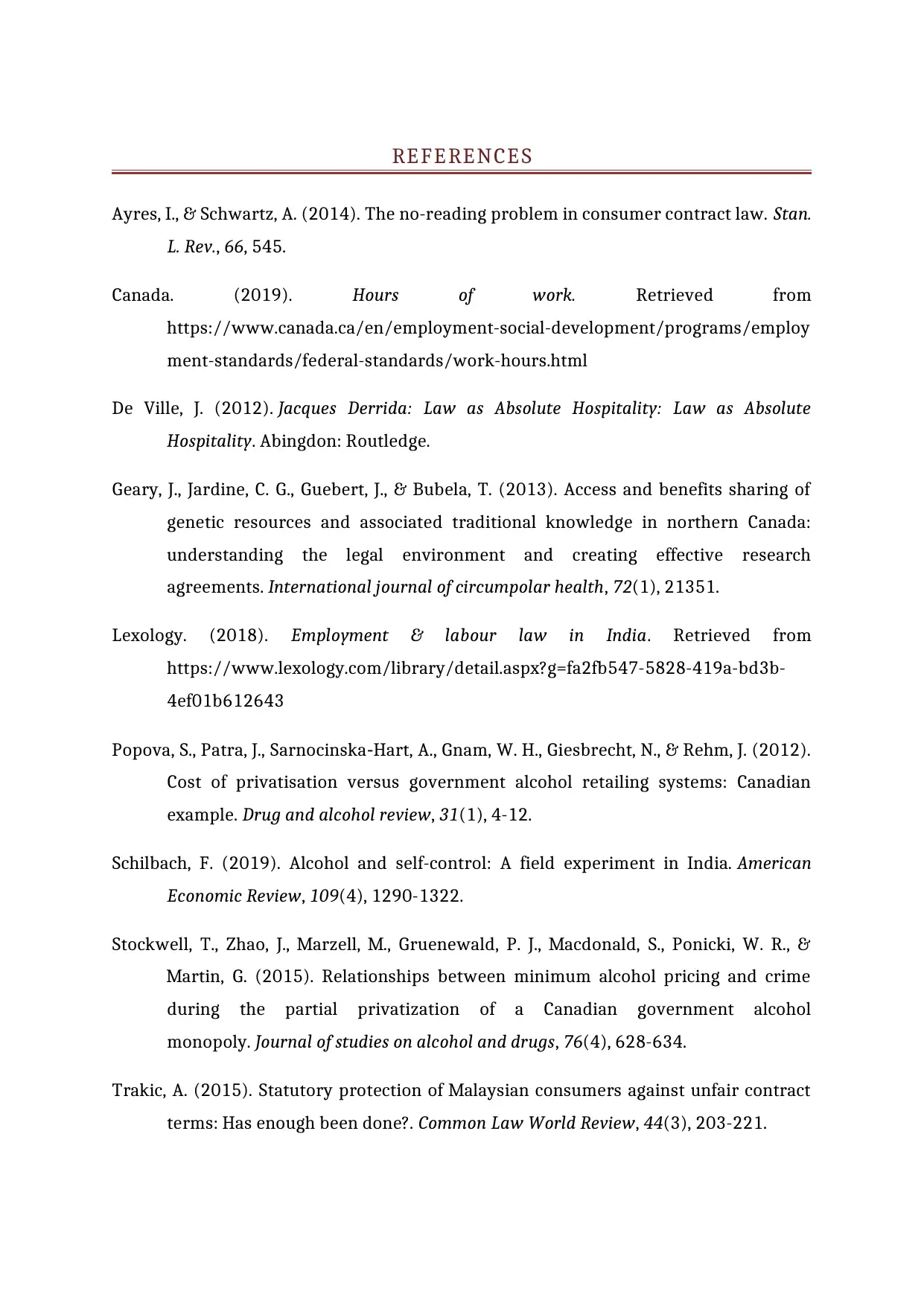
REFERENCES
Ayres, I., & Schwartz, A. (2014). The no-reading problem in consumer contract law. Stan.
L. Rev., 66, 545.
Canada. (2019). Hours of work. Retrieved from
https://www.canada.ca/en/employment-social-development/programs/employ
ment-standards/federal-standards/work-hours.html
De Ville, J. (2012). Jacques Derrida: Law as Absolute Hospitality: Law as Absolute
Hospitality. Abingdon: Routledge.
Geary, J., Jardine, C. G., Guebert, J., & Bubela, T. (2013). Access and benefits sharing of
genetic resources and associated traditional knowledge in northern Canada:
understanding the legal environment and creating effective research
agreements. International journal of circumpolar health, 72(1), 21351.
Lexology. (2018). Employment & labour law in India. Retrieved from
https://www.lexology.com/library/detail.aspx?g=fa2fb547-5828-419a-bd3b-
4ef01b612643
Popova, S., Patra, J., Sarnocinska‐Hart, A., Gnam, W. H., Giesbrecht, N., & Rehm, J. (2012).
Cost of privatisation versus government alcohol retailing systems: Canadian
example. Drug and alcohol review, 31(1), 4-12.
Schilbach, F. (2019). Alcohol and self-control: A field experiment in India. American
Economic Review, 109(4), 1290-1322.
Stockwell, T., Zhao, J., Marzell, M., Gruenewald, P. J., Macdonald, S., Ponicki, W. R., &
Martin, G. (2015). Relationships between minimum alcohol pricing and crime
during the partial privatization of a Canadian government alcohol
monopoly. Journal of studies on alcohol and drugs, 76(4), 628-634.
Trakic, A. (2015). Statutory protection of Malaysian consumers against unfair contract
terms: Has enough been done?. Common Law World Review, 44(3), 203-221.
Ayres, I., & Schwartz, A. (2014). The no-reading problem in consumer contract law. Stan.
L. Rev., 66, 545.
Canada. (2019). Hours of work. Retrieved from
https://www.canada.ca/en/employment-social-development/programs/employ
ment-standards/federal-standards/work-hours.html
De Ville, J. (2012). Jacques Derrida: Law as Absolute Hospitality: Law as Absolute
Hospitality. Abingdon: Routledge.
Geary, J., Jardine, C. G., Guebert, J., & Bubela, T. (2013). Access and benefits sharing of
genetic resources and associated traditional knowledge in northern Canada:
understanding the legal environment and creating effective research
agreements. International journal of circumpolar health, 72(1), 21351.
Lexology. (2018). Employment & labour law in India. Retrieved from
https://www.lexology.com/library/detail.aspx?g=fa2fb547-5828-419a-bd3b-
4ef01b612643
Popova, S., Patra, J., Sarnocinska‐Hart, A., Gnam, W. H., Giesbrecht, N., & Rehm, J. (2012).
Cost of privatisation versus government alcohol retailing systems: Canadian
example. Drug and alcohol review, 31(1), 4-12.
Schilbach, F. (2019). Alcohol and self-control: A field experiment in India. American
Economic Review, 109(4), 1290-1322.
Stockwell, T., Zhao, J., Marzell, M., Gruenewald, P. J., Macdonald, S., Ponicki, W. R., &
Martin, G. (2015). Relationships between minimum alcohol pricing and crime
during the partial privatization of a Canadian government alcohol
monopoly. Journal of studies on alcohol and drugs, 76(4), 628-634.
Trakic, A. (2015). Statutory protection of Malaysian consumers against unfair contract
terms: Has enough been done?. Common Law World Review, 44(3), 203-221.
⊘ This is a preview!⊘
Do you want full access?
Subscribe today to unlock all pages.

Trusted by 1+ million students worldwide
1 out of 6
Related Documents
Your All-in-One AI-Powered Toolkit for Academic Success.
+13062052269
info@desklib.com
Available 24*7 on WhatsApp / Email
![[object Object]](/_next/static/media/star-bottom.7253800d.svg)
Unlock your academic potential
Copyright © 2020–2025 A2Z Services. All Rights Reserved. Developed and managed by ZUCOL.





